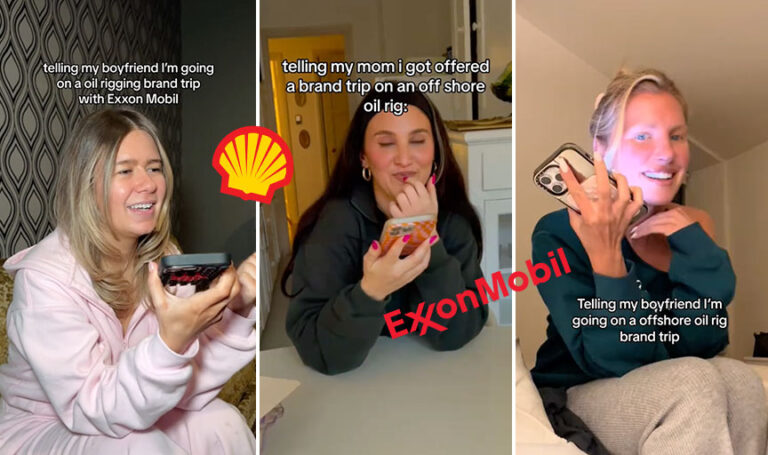Influencers are pranking their loved ones by claiming ExxonMobil has invited them on an oil rig brand trip

“So, I need to know by tonight, but I got invited on this brand trip,” content creator Brigette told her boyfriend on the phone on 23 of February 2024. The influencer, who has over 800,000 followers on TikTok had set up a camera that was capturing the conversation. “It’s with ExxonMobil,” Brigette continued, chuckling at his audibly confused reaction.
@acquiredstyle LMAOOOO
♬ original sound - ACQUIRED STYLE
TikTok has inspired dozens of influencers to call their partners and parents to tell them that they were offered the exceptional opportunity of visiting an oil rig off the coast of Texas, paid for by American gas company ExxonMobil. Weird flex, but okay…
If the internet is abundant with one thing, it’s creativity—and pranks. Add in a sprinkle of social commentary and you’ve basically got the perfect TikTok video.
ExxonMobil, whose representatives communicated with The New York Times, clarified that the gas company is not reaching out to social media influencers for partnership deals or oil rig-inspired carousel posts.
Nevertheless, the same cannot be said about its competition.
It’s a well-known fact that oil companies such as Shell have previously partnered with popular gamers and online youth influencers to promote fossil fuels to Gen Z. Yup, you read that right.
In July 2023, the company collaborated with multiple Fortnite creators and popular gamers on other platforms such as Twitch to promote its ultimate road trips promotion, as reported by The Guardian.
The oil giant set up a new island in Fortnite, filled with speed, acceleration, adventure and performance that was just ‘coincidentally’ powered by its new real-life gasoline, called V-Power Nitro+.
@screenshothq The oil titan announced a marketing campaign for a new gasoline, named V-Power Nitro+ Shell released previews of the promotion gameplay – which includes fossil fuel petrol stations, branded with the company’s logo and colours #shellroadtrips #fortnite #fortniteshell #shell #gasoline #vpowernitro #CapCut
♬ Electro Swing - Fortnite
According to the American non-profit organisation Media Matters, Shell spent a fortune on these digital marketing campaigns, complete with hashtags and a cohort of influencers followed by millions, all in an attempt to glamourise fossil fuels for Gen Z.
Of course, fossil fuel companies aren’t the only ones who have realised that if you package a product in the right way, Gen Z might buy it—or at least make a TikTok about it—despite all its negative connotations. States like Russia and the UK have also started to tap into influencer marketing to digitalise, personalise and romanticise government campaigns and political propaganda.
@okcallie ♬ original sound - Callie
Yet, if netizens are anything, it is hypervigilant about fake and inauthentic brand offerings. So much so that the pure concept of fossil fuel companies reaching out to influencers even inspired this comedic trend.
Interestingly enough, it seems as though most parents weren’t overly concerned about the idea of their offspring standing in the middle of the ocean on a metal structure while watching it extract oil from the ground (That’s what an oil rig does, right? Wait, let me google it… Ok, I’m back. Yep, nailed it).
Imagining doing that prank where girls call their dad and say they got a job at an oil rig except my dad would be like “sounds good, anyway have you watched that new game show The Floor on TV”
— skete (@LoRove) February 26, 2024
I tried to do that TikTok prank where you call your dad and say that you’re going to be doing underwater welding on an oil rig and he was like oh good for you instead of that’s fucking dangerous lol
— Jordan (Taylor’s Version) (@Jordan96Martin) February 25, 2024
Some content creators even seemed genuinely offended that their parents didn’t express more concern for their safety.
However, this TikTok trend isn’t about the safety of oil rigs, it’s about oil and gas companies persistently attempting to create the narrative that these sites are adventurous and benign to a generation that is painfully aware of their negative impact on the environment and local communities.
There is something very eerie and weird about posts with the hashtag #Shellroadtrip on the same feed that gets updates from Greta Thunberg, Leah Thomas and Just Stop Oil. It’s a noticeable outlier and a flawed attempt to stay relevant to a generation that has very vocally and repeatedly rejected these companies. An oil rig contradicts with the seemingly beautiful and glamorous life of influencers just as much as it contradicts with the ideological mindset of Gen Zers.





